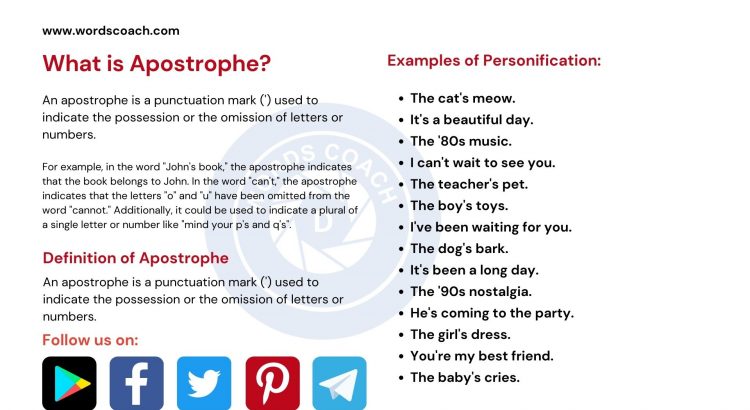An apostrophe is a punctuation mark (‘) used to indicate the possession or the omission of letters or numbers.
For example, in the word “John’s book,” the apostrophe indicates that the book belongs to John. In the word “can’t,” the apostrophe indicates that the letters “o” and “u” have been omitted from the word “cannot.” Additionally, it could be used to indicate a plural of a single letter or number like “mind your p’s and q’s”.
Definition of Apostrophe
According to the Oxford Dictionary of Literary Terms, the apostrophe is defined as “a rhetorical figure in which the speaker addresses a dead or absent person, or an abstraction or inanimate object”.
Examples of Apostrophe
Here are a few examples of how apostrophes are used:
- Possession: “The dog’s tail wagged happily.” (indicating that the tail belongs to the dog)
- Contraction: “I’m going to the store.” (short for “I am”)
- Omission: “The class of ’95” (indicating that “1995” is omitted)
- Plural of single letter: “Mind your p’s and q’s.”
- Plural of numbers and letters: “He got all A’s in his exams”
These are just a few examples, but apostrophes can be used in a variety of ways to indicate possession, contractions, or omitted letters or numbers.
Here are 20 examples of apostrophes being used:
- The cat’s meow. (indicating that the meow belongs to the cat)
- It’s a beautiful day. (short for “it is”)
- The ’80s music. (indicating that “1980s” is omitted)
- I can’t wait to see you. (short for “I cannot wait”)
- The teacher’s pet. (indicating that the pet belongs to the teacher)
- The boy’s toys. (indicating that the toys belong to the boy)
- I’ve been waiting for you. (short for “I have been waiting”)
- The dog’s bark. (indicating that the bark belongs to the dog)
- It’s been a long day. (short for “it has been a long day”)
- The ’90s nostalgia. (indicating that “1990s” is omitted)
- He’s coming to the party. (short for “he is coming”)
- The girl’s dress. (indicating that the dress belongs to the girl)
- You’re my best friend. (short for “you are my best friend”)
- The baby’s cries. (indicating that the cries belong to the baby)
- They’re going to the movies. (short for “they are going”)
- The car’s engine. (indicating that the engine belongs to the car)
- I’d like to go out tonight. (short for “I would like to go out tonight”)
- The ’60s fashion. (indicating that “1960s” is omitted)
- He’s got a new job. (short for “he has got a new job”)
- The dog’s leash. (indicating that the leash belongs to the dog)
Note that some of the examples use apostrophes to indicate possession and others use apostrophes to indicate contractions.






